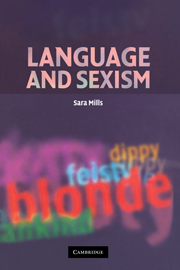Summary
I have argued that overt, direct sexism can be and has been challenged through a variety of reforming measures. However, this challenging of sexism by feminists has led to two responses: one, the development of the notion of ‘political correctness’ and ‘political incorrectness’, both of which implicitly criticise feminist interventions, and the other, the development of what I shall be calling indirect sexism (see Lazar's (2005) subtle sexism). In order to describe indirect sexism, it is necessary to consider in more detail the proposition that I have referred to throughout this book so far, that sexism can be best described if we consider it as a resource available within the language. I will therefore describe the model of language I am using which enables us to describe sexism as a resource; then I go on to analyse the notion of stereotype more fully, since it is clear that stereotypes of women are not necessarily agreed upon, even within one particular society. I then examine the way that indirect sexism manifests itself.
Language as a system
In analysing sexism, we need to be very aware that the language available to us is not a static system, although it sometimes feels as if it is (especially if we focus on the analysis of written texts). A language is a product of negotiations over meaning in the past as well as in the present, and even some words which we find archaic still remain in use amongst sections of the population.
- Type
- Chapter
- Information
- Language and Sexism , pp. 124 - 153Publisher: Cambridge University PressPrint publication year: 2008



